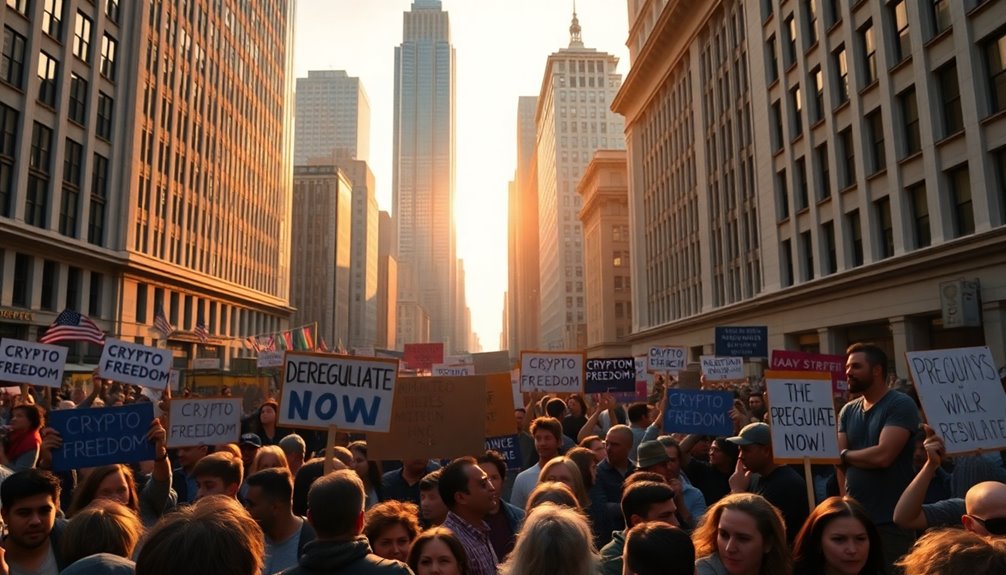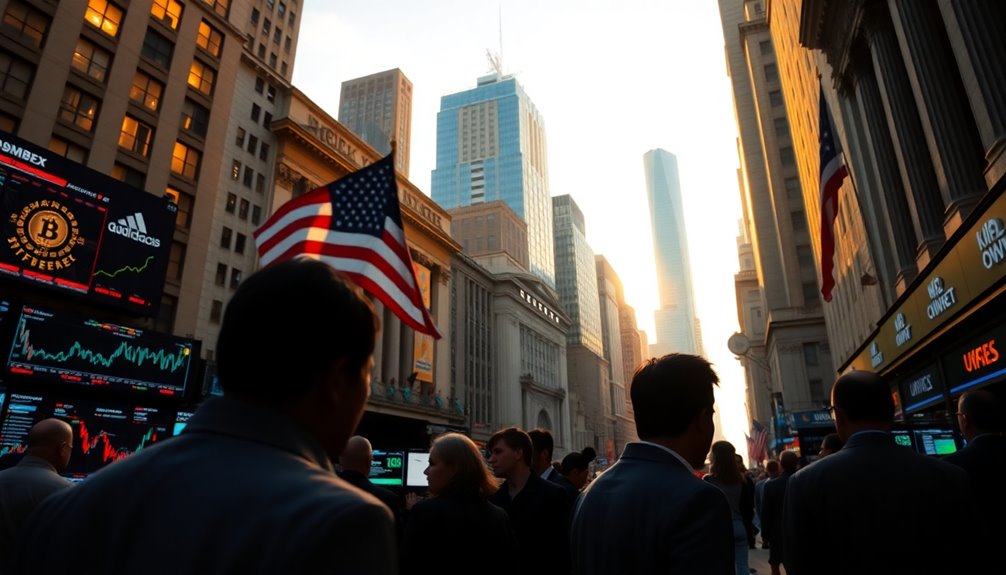Under Trump, promises of crypto deregulation aimed to boost innovation and strengthen the U.S. dollar's status. Initially skeptical, he later recognized blockchain's benefits, pushing for a more collaborative regulatory approach. The SEC shifted focus from strict enforcement to a framework encouraging crypto engagement. Banks began offering crypto services, easing traditional finance's transition. Proposals like the Bitcoin Strategic Reserve aimed to position the U.S. as a leader in digital assets. Although some promises were met, complexities remain in the regulatory landscape. To understand the full impact of these changes, you might explore further insights into what really happened.
Key Takeaways
- Trump's initial skepticism of cryptocurrencies shifted towards recognizing blockchain's potential for improving cross-border payments and digital asset management.
- The anticipated deregulation led to banks easing their engagement with cryptocurrencies, including offering custody and trading services.
- Changes in SEC regulations focused on fraud rather than strict enforcement, aligning with the promise of a more permissive regulatory environment.
- The creation of the Crypto Advisory Council aimed to streamline regulations while fostering innovation and financial stability in the crypto sector.
- Despite these developments, the complex patchwork of state and local regulations continues to challenge the overarching goals of crypto deregulation.
Trump's Evolving Crypto Position

Although Trump initially expressed skepticism about cryptocurrency, viewing it as a threat to the US dollar, his position evolved significantly over time.
Early on, you might remember him criticizing Bitcoin for its volatility and potential use in illicit activities. He even reinforced the US dollar's status as the "strongest currency in the world" and enforced strict regulations on crypto transactions.
However, as time passed, he began to recognize the benefits of blockchain technology and the potential for cryptocurrencies in cross-border payments. This shift led to his involvement in launching World Liberty Financial, a crypto venture, which aimed to capitalize on the growing interest in digital assets and raise funds through crypto donations.
Trump's changing views illustrate a remarkable transformation from skepticism to embracing the crypto space, highlighting its growing significance in the economy.
Changes in SEC Regulations

As the regulatory landscape for cryptocurrencies evolves, the SEC is poised to make significant changes under Trump's administration. You can expect a reduced focus on enforcement actions against crypto companies, with an emphasis on fraud rather than registration issues. The SEC is likely to reverse Gary Gensler's "regulation by enforcement" approach, potentially issuing no-action letters for clarity. Hester Peirce's proposal for a more permissive regulatory structure could influence these changes. Additionally, the SEC may revisit how digital tokens are classified, impacting their determination as securities. Legislative efforts like the FIT 21 Act may further establish a clearer framework, guiding the SEC's rulemaking processes and providing the industry with much-needed regulatory certainty. Moreover, the SEC's anticipated collaboration with CFTC, Treasury, and other agencies is expected to enhance the regulatory framework for digital assets.
Deregulation Effects on Finance

Deregulation under Trump's administration is set to transform the financial landscape, making it easier for traditional banks to engage with cryptocurrencies.
With reduced regulatory restrictions, banks may start offering crypto services like custody and trading, accelerating cryptocurrency adoption.
The establishment of a regulatory cost budget means agencies must repeal two rules for every new one, easing entry barriers for conventional banks.
Simplified oversight can reduce bureaucratic hurdles, fostering financial innovation and promoting blockchain adoption. However, this could lead to unregulated competitors posing competitive issues and increasing financial stability concerns.
As state and local governments step in amid the lack of federal regulation, we could see a complex patchwork of rules emerge, impacting the overall financial ecosystem. Additionally, the Comptroller of the Currency will play a crucial role in shaping how banks can engage with digital assets moving forward.
Proposed Bitcoin Strategic Reserve

While the idea of a Proposed Bitcoin Strategic Reserve may seem unconventional, it aims to position the U.S. as a leader in cryptocurrency management. This initiative seeks to control the bitcoin supply, preventing it from falling into the hands of bad actors and curbing the rise of alternative currencies. By accumulating a significant stockpile, the U.S. could bolster the dollar's status as the world reserve currency while acting as a hedge against economic instability. Moreover, the U.S. currently holds 198,000 bitcoins valued at approximately $21 billion, showcasing its potential influence in the market. Additionally, implementing a strategic reserve could enhance digital asset management by providing a structured approach to cryptocurrency oversight. However, challenges like regulatory frameworks and political will could hinder its implementation. Despite these hurdles, the prospect of a strategic reserve has already sparked optimism among investors, potentially driving bitcoin prices to unprecedented heights.
Formation of Crypto Advisory Council

The formation of the Crypto Advisory Council marks a significant step in shaping the future of cryptocurrency regulation in the United States.
This council, comprising around 24 CEOs and founders from top blockchain firms, aims to provide expert guidance on digital asset policy.
You'll see them collaborating closely with Congress to draft comprehensive legislation covering taxation, investor protection, and anti-money laundering standards.
They'll also coordinate with key regulatory agencies like the SEC and CFTC to streamline enforcement efforts. The council will focus on balancing innovation with financial stability, which is crucial for sustainable growth in the sector.
With leadership potentially from Bo Hines and David Sacks, the council seeks to enhance regulatory transparency and foster a favorable environment for cryptocurrencies.
Their initiatives could accelerate mainstream adoption and position the U.S. as a global leader in digital asset management.
Frequently Asked Questions
How Did Trump's Policies Affect Individual Crypto Investors?
Trump's policies significantly impacted you as an individual crypto investor.
With clearer regulatory guidelines and increased banking access for crypto firms, you likely felt more confident navigating the market.
The optimism surrounding his pro-crypto stance may have encouraged you to invest more, while the potential for greater market growth inspired excitement.
However, it's essential to stay aware of the risks and volatility that can arise with increased investment in this rapidly evolving space.
What Are the Potential Risks of Crypto Deregulation?
Crypto deregulation poses several risks that you should be aware of.
Without clear regulation, you might face inadequate consumer protection and increased market volatility, making it tough to navigate investments.
The lack of oversight can lead to higher fraud rates and potential money laundering incidents.
Additionally, inconsistent regulations create confusion and regulatory gaps, leaving you vulnerable to scams and misinformation.
How Do International Regulations Compare to Trump's Crypto Approach?
Think of international crypto regulations as a sturdy bridge, while Trump's approach resembles a rickety path through the woods.
You'll notice that countries like the EU and Japan have laid down comprehensive frameworks, ensuring safety and transparency.
In contrast, Trump's stance often lacked structure and oversight, leaving room for uncertainty and risk.
As you navigate these contrasting landscapes, it becomes clear that robust regulations can foster stability, while deregulation can invite chaos.
What Impact Did Deregulation Have on Crypto Scams?
Deregulation significantly increased the prevalence of crypto scams.
You might notice scammers using sophisticated tactics, like phishing campaigns, to exploit unsuspecting donors. With lax regulations, they've found a more favorable environment to operate, often mimicking legitimate campaigns to trick people.
As volatility spikes, scams thrive, making it essential to stay vigilant. The lack of stringent oversight creates opportunities for fraudsters, increasing the risk of financial losses for investors like you.
How Did the Public Perceive Trump's Crypto Policies?
You might've noticed that the public's perception of Trump's crypto policies shifted dramatically.
Initially skeptical, many embraced his pro-crypto stance during his campaign, hoping for deregulation and increased investment opportunities. As cryptocurrency values soared post-election, optimism grew among investors.
However, concerns about potential conflicts of interest and regulatory leniency lingered. Overall, the public held a positive view, anticipating a more favorable environment for the crypto industry under Trump's leadership.
Conclusion
In the end, Trump's promises on crypto deregulation painted a picture of a flourishing digital landscape, but the reality felt more like a mirage. While some changes in SEC regulations aimed to ease the path, the effects on finance were mixed, leaving many still navigating uncertainty. The proposed Bitcoin Strategic Reserve and the Crypto Advisory Council showed ambition, yet it's clear that the road ahead remains bumpy. Ultimately, the dream of a deregulated crypto utopia is still just that—a dream.









